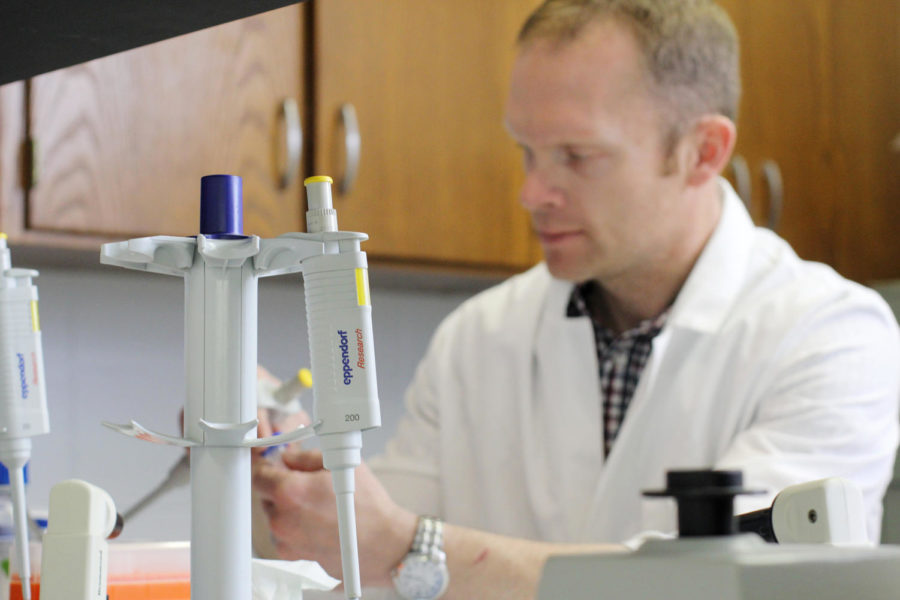ISU professor wins 2013 Bio-Serv Award
Photo: Jared Raney/Iowa State Daily
Matthew Rowling, assistant professor in food science and human nutrition and winner of the 2013 Bio-Serv Award, demonstrates his work on vitamin D deficiency, a common problem for diabetics.
April 18, 2013
For $270, Matthew Rowling bought himself a rat. Not just any rat, however, a Type 2 diabetic rat, perfect for his award-winning research.
Rowling, assistant professor of food science and human nutrition, won the 2013 Bio-Serv Award last February for his work studying nutritional deficiencies in diabetics.
Diabetics face many concerns because of their disease, among them kidney problems due to vitamin D deficiency.
“It could help people with diabetes maintain normal nutrition. People have this issue, which frequently happens, and their diet might not be sufficient,” Rowling said. “Even if it doesn’t cure diabetes, [our research] can help protect the kidney.”
The Bio-Serv award is specifically given to junior researchers, based on research done within 10 years of getting a master’s degree. It’s also specifically awarded for the use of experimental animals in research.
Rowling said they use the rats to model different diabetic types, such as Type 1 and Type 2 diabetes, and how different diets can affect the nutritional status of patients, in this case, the rats.
“We’re not doing it to improve the health of the rat, we’re using models of diabetes,” said Kevin Schalinske, another professor from food science and human nutrition, as well as Rowling’s old adviser.
An award committee from Iowa State selects the ISU candidates, then the nominees for the award are evaluated by the American Society for Nutrition, and the honor of receiving the award is complemented by a $1,000 cash prize.
Schalinske said that Iowa State usually merits at least one award every year for its researchers.
“If it has a strong translational component, I think that’s the key,” Schalinske said. “How well does this translate into something that could have very practical, viable implications for humans?”
There are usually five to six nominations each year, and, though most years a winner is chosen, it is not guaranteed that any of the nominees will win the award.
“To have that recognition is important,” Rowling said. “What I get the most reward out of is when I see a student that conducted this work, that contributed to it and you see these rewards down the line. I wouldn’t be able to do this without my students. It kind of makes you feel like everything was worth it.”
Rowling said the next step will be to begin testing humans for these deficiencies and mapping out how they can overcome it.
“If you can show that people who are diabetic, and there are millions out there, especially Type 2, are becoming vitamin D deficient, that’s easily translatable, because [with this research] they can undergo some sort of therapy to prevent that,” Schalinske said.
Rowling also recently had another paper accepted pending revisions by ”Nutrition and Science” and is hopeful about an upcoming $250,000 pending grant from the American Diabetes Association.







